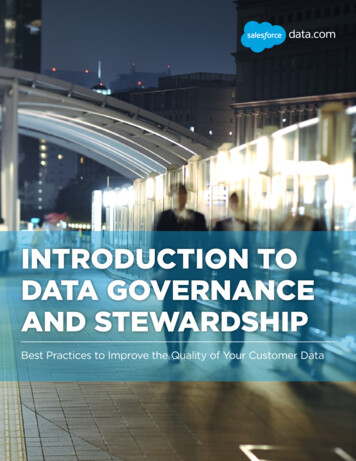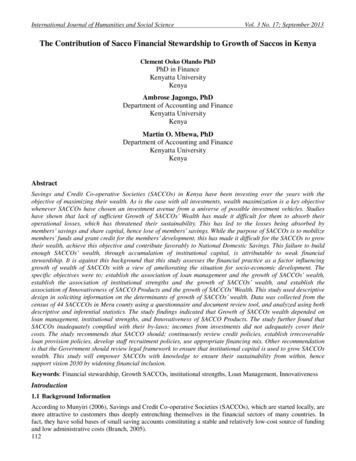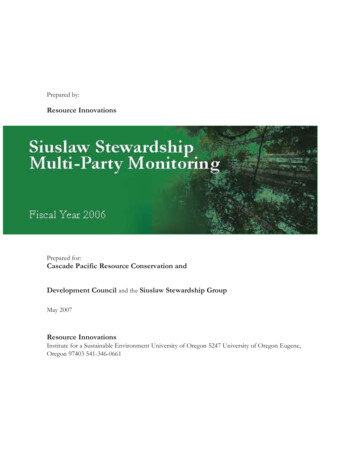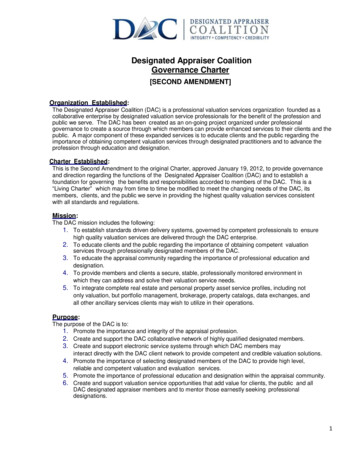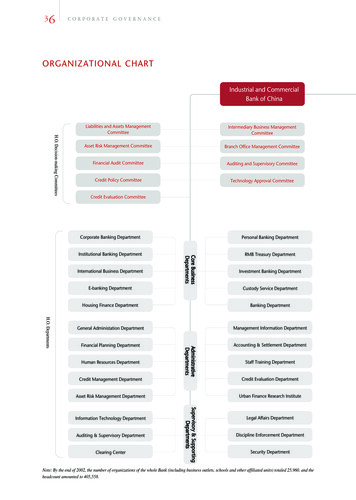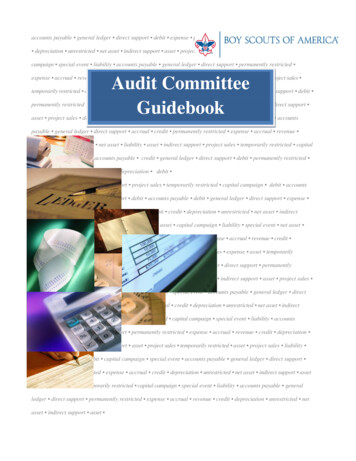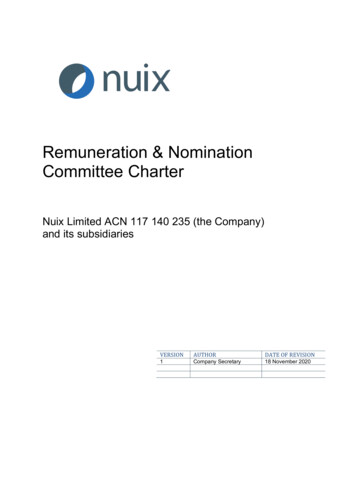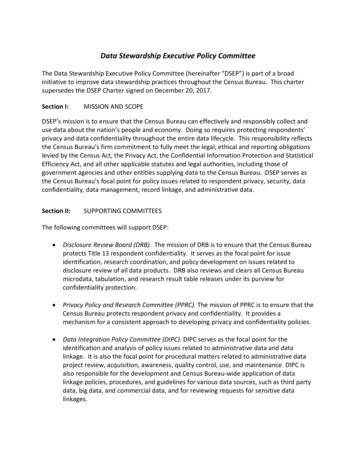
Transcription
Data Stewardship Executive Policy CommitteeThe Data Stewardship Executive Policy Committee (hereinafter “DSEP”) is part of a broadinitiative to improve data stewardship practices throughout the Census Bureau. This chartersupersedes the DSEP Charter signed on December 20, 2017.Section I:MISSION AND SCOPEDSEP’s mission is to ensure that the Census Bureau can effectively and responsibly collect anduse data about the nation’s people and economy. Doing so requires protecting respondents’privacy and data confidentiality throughout the entire data lifecycle. This responsibility reflectsthe Census Bureau’s firm commitment to fully meet the legal, ethical and reporting obligationslevied by the Census Act, the Privacy Act, the Confidential Information Protection and StatisticalEfficiency Act, and all other applicable statutes and legal authorities, including those ofgovernment agencies and other entities supplying data to the Census Bureau. DSEP serves asthe Census Bureau’s focal point for policy issues related to respondent privacy, security, dataconfidentiality, data management, record linkage, and administrative data.Section II:SUPPORTING COMMITTEESThe following committees will support DSEP: Disclosure Review Board (DRB). The mission of DRB is to ensure that the Census Bureauprotects Title 13 respondent confidentiality. It serves as the focal point for issueidentification, research coordination, and policy development on issues related todisclosure review of all data products. DRB also reviews and clears all Census Bureaumicrodata, tabulation, and research result table releases under its purview forconfidentiality protection. Privacy Policy and Research Committee (PPRC). The mission of PPRC is to ensure that theCensus Bureau protects respondent privacy and confidentiality. It provides amechanism for a consistent approach to developing privacy and confidentiality policies. Data Integration Policy Committee (DIPC). DIPC serves as the focal point for theidentification and analysis of policy issues related to administrative data and datalinkage. It is also the focal point for procedural matters related to administrative dataproject review, acquisition, awareness, quality control, use, and maintenance. DIPC isalso responsible for the development and Census Bureau-wide application of datalinkage policies, procedures, and guidelines for various data sources, such as third partydata, big data, and commercial data, and for reviewing requests for sensitive datalinkages.
Data Management Committee (DMC). DMC’s mission is to examine issues relating to themanagement and efficient and responsible use of Census Bureau informationthroughout its lifecycle. DMC’s role is to identify issues requiring policy development, toconduct policy research and analysis, to document the research, and to present itsrecommendations and findings to the DSEP. Health Insurance Portability and Accountability Act (HIPAA) Privacy Board (HPB). TheHPB reviews the Census Bureau’s planned acquisition and use of HIPAA-protectedhealth information (PHI) for its statistical activities, and where appropriate, approves analteration to or waiver of the requirement for individual authorizations to use the data.The HPB may also make recommendations to DSEP specific to the Census Bureau’s useof PHI or other considerations under the HIPAA Privacy Rule.The chair of each supporting committee will update DSEP regularly. In addition to providing anupdate on the work being conducted by the committees and the issues they are considering,these reports may include informational summaries of operational decisions and actions notrequiring DSEP’s review and approval, or the status of efforts to develop policy papers forDSEP’s consideration.Each of the committee chairs will also be responsible for consulting and coordinating with theother committee chairs on issues of mutual relevance.DSEP will receive updates from supporting committees as needed, at the discretion of eitherthe supporting committee chairs or DSEP members.Section III:DUTIES AND RESPONSIBILITIESDSEP sets policy and makes decisions on policy-related matters within the scope of this charter.It shall, as needed, assign subjects of concern to the supporting committees for analysis. Afterreceiving a committee’s report, DSEP will subsequently review the committee’s findings, andapprove, modify, or disapprove its recommendations.The Chief, Policy Coordination Office, or his or her designee, will ensure that any topicspresented to DSEP have been sufficiently vetted, and that these presentations have beencleared by the presenter’s associate director and any appropriate DSEP supporting committees.DSEP members are responsible for approving presentations to the committee from theirbusiness/program areas. DSEP members are also responsible for ensuring that any action itemsfrom the committee that fall to their business/program areas are assigned and addressed in atimely fashion.2
Each of the supporting committees may develop issues and make recommendations on its own,with the input of relevant division chiefs, as indicated above. In addition, DSEP may considerrelated policy issues originating from any other part of the Census Bureau but may refer suchmatters to one or more of its supporting committees for analysis and recommendations.DSEP will publish formal policy documents through PCO in order to make known its decisionson specific matters, and to serve as guidance for future issues that may arise. DSEP willapprove and publish updated policies and guidelines for Census Bureau activities related torespondent privacy, security, data confidentiality, data management, and administrative data.In pursuit of its objectives, DSEP may periodically ask one or more supporting committees toorganize workshops or conduct special reviews of policy issues related to respondent privacy,security, data confidentiality, data management, and administrative data.DSEP will also adjudicate appeals of supporting committee decisions (e.g. a Disclosure ReviewBoard determination), sensitive record linkages, requests for off-site access to Title 13protected data, and Center for Economic Studies reviews of Research Data Center researchproject proposals.Section IV:MEMBERSHIPStanding Members:Deputy Director/Chief Operating Officer (Chair)Associate Director for Decennial Census ProgramsAssociate Director for Demographic ProgramsAssociate Director for Economic ProgramsAssociate Director for Field OperationsAssociate Director for Research and Methodology and Chief ScientistChief Information OfficerChief, Office of Program, Performance, and Stakeholder IntegrationsChief of StaffAssistant Director for CommunicationsAssistant Director for Research and MethodologyChief of the Policy Coordination Office/ Chief Privacy OfficerAt-Large Members:In addition to the standing membership, the Chair will designate two (2) at-large members toserve a two-year term on the committee. These members will be chosen for their subjectmatter expertise related to enterprise-wide issues. Rotating members may serve twoconsecutive terms.3
Alternates:If a member is unable to attend a DSEP meeting, the member may designate an alternate torepresent his or her area. Alternates attending for voting members represent their areas duringcommittee deliberations.In the event that the Chair is unable to attend the meeting, unless he or she designatesotherwise, the Chief of Staff will serve as the alternate Chair.Other Participants:Other leadership may be asked to participate, as warranted, including the Chief FinancialOfficer, Chief Administrative Officer, Chief Information Security Officer, and Chief of the Officeof Security.DSEP Permanent Staff:The Policy Coordination Office will provide staff support for DSEP.Section V:MEETINGSFrequency:DSEP shall schedule a standing biweekly meeting and special meetings at the chair’s request.Agendas:The DSEP permanent staff shall circulate an agenda before each meeting. Any DSEP member,or the chair of any of the supporting committees, may schedule items for discussion. The Chiefof the Policy Coordination Office or his or her designee shall review the agenda, and anysupporting documents to be provided for DSEP members’ consideration, before such materialsare circulated to the members.Quorum:DSEP meetings require a quorum of two thirds of the membership. If the committee does notestablish quorum for the meeting, the Chair may, depending on the committee’s business andits potential impact on absent members, decide to waive quorum.Decisions:DSEP will reach its decisions by consensus, and the meeting record will reflect the overalldecision of the committee. The Chair may call for a vote to determine members’ support for aparticular decision, however if the committee cannot reach a consensus, the committee Chairwill make the final decision.4
Section VI:DOCUMENTATIONThe permanent staff will prepare agendas for all DSEP meetings, and prepare a meeting recordafter each meeting. These meeting records will be circulated in draft form for comment priorto being finalized.Documents signed by the DSEP Chair will represent the committee’s decision by consensus.DSEP will have a location on the Policy Coordination Office Intranet site where meeting recordsand significant documents will be posted. Guidelines and policy statements on respondentprivacy, data confidentiality, data management, record linkage, and administrative data shall beavailable on the DSEP Intranet site.Additionally, information about DSEP, including the “DS” series of Data Stewardship policies willbe posted on the public internet site (census.gov).Members may notify PCO of other staff in their areas that they wish to put on the DSEPnotification list, so that a wider audience will receive meeting notices and documentation ofDSEP decisions. Chairs of the supporting committees will be included on the DSEP notificationlist, and will attend meetings as necessary.Section VII:APPROVAL/SIGNATURESummary InformationPolicy TitleVersionPolicy OwnerPolicy ContactPolicy Review CyclePolicy Coordination Office(PCO)Chief, PCO/Chief PrivacyOfficerData Stewardship Executive Policy Committee CharterDSEP Charter. February 2019 (supersedes December 2017)Office Responsible forPolicy Coordination OfficeImplementationOffice Responsible forPolicy Coordination OfficeDisseminationAnnually (as agreed upon by DSEP members)5
Data Stewardship Executive Policy Committee . The Data Stewardship Executive Policy Committee (hereinafter "DSEP") is part of a broad initiative to improve data stewardship practices throughout the Census Bureau. This charter . DSEP, charter, confidentiality, governance, privacy"

